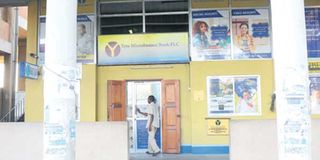Bank that isn’t hurt by bad loans

What you need to know:
- The only listed microfinance bank on the Dar es Salaam Stock Exchange (DSE), it has been posting profits in the last 12 years. The management attributes the success to the focus on small-scale businesses and investment in technologies.
Dar es Salaam. Although the Tanzanian banking industry is battling non-performing loans, Yetu Microfinance Bank is unscathed.
The only listed microfinance bank on the Dar es Salaam Stock Exchange (DSE), it has been posting profits in the last 12 years. The management attributes the success to the focus on small-scale businesses and investment in technologies.
“We are now investing in various technologies to help small-scale farmers benefit from digital loans, biometric teller system and other services,” says Yetu managing director Altemius Millinga.
He says the bank generated a profit of Sh800 million in the last quarter and the plan is to double it in the next quarter.
Yetu started as a small microfinance institution to support operators of low incomes. Known as Youth Self Employment Foundation (Yosefo) it had a capital of Sh10 million. It started operations in 1996 with only six members of staff.
However, today it is a microfinance bank with a capital of Sh8.25 billion.
Yosefo borrowed funds from international organisations for lending to its 350 customers.
By 2011, it had accumulated Sh2.5 billion and applied for a licence to operate as a microfinance bank. By that time, according to the Bank of Tanzania, the condition was to have a capital of Sh800 million.
In the process of seeking a licence, the criterion changed and now, to become a microfinance bank, the capital should be Sh5 billion.
Yosefo had only Sh2.5 billion but the dreams were not shattered. In 2014, the name changed into Yetu Microfinance Bank as it went on looking for opportunities to meet the criteria. Yetu took over the entire Yosefo’s microfinance business.
In 2015 it opted to raise the capital through DSE’s Enterprise Growth Market (EGM), which is a window for small companies, to raise capital through the stock exchange.
Through an initial public offering, Yetu Microfinance Bank raised Sh2.5 billion in the same year and in 2016 the company was listed on the DSE.
In 2017, it got a licence to operate as a microfinance bank.
Currently, Yetu Microfinance Plc has total assets of Sh15.52 billion, according to 2017 figures.
It is also seeking to raise capital and move from the EGM to the main investment segment of the DSE.
Strategies
One of the strategies that make the bank remain in the market is investing in various technologies to support remote account opening, biometric teller system as well as digital loans introduced purposely to farmers.
The bank, which focuses on micro and small-scale businesses says it has not been affected by NPLs because it did not change the model of operation, adding that only large businesses are affected by the economic changes in Tanzania.
According to Yetu managing director Altemius Millinga, the bank has 65,000 customers and the plan is to increase up to 200,000 in the next three years.
Last year, it loaned Sh1.4 billion to cashew-nut farmers.
He says the target is to improve the financial inclusion.
“We are the first bank to introduce biometric teller system and this is due to the nature of our customers whom the majority do not know how to write.”
Technologies
The bank has introduced mobile banking, digital loans, android-supported remote account opening technology and biometric teller system to reduce costs as well as increase revenue while addressing issues around financial inclusion.
Offering customer centric products especially those focus low-end financial market that include solidarity group loans, cashew-nuts inputs loans, digital loans, agro assets loans and housing microfinance.
The bank covers Dar es Salaam, Coast, Lindi, Mtwara, Morogoro, Tanga, Iringa and Zanzibar.
It introduced a housing loan in last year. Sh2.7-billion loans have been issued to 625 customers. By the end of this year the plan is issue loans of Sh3.5 billion for housing.
The bank also plans to invest more in technologies.




